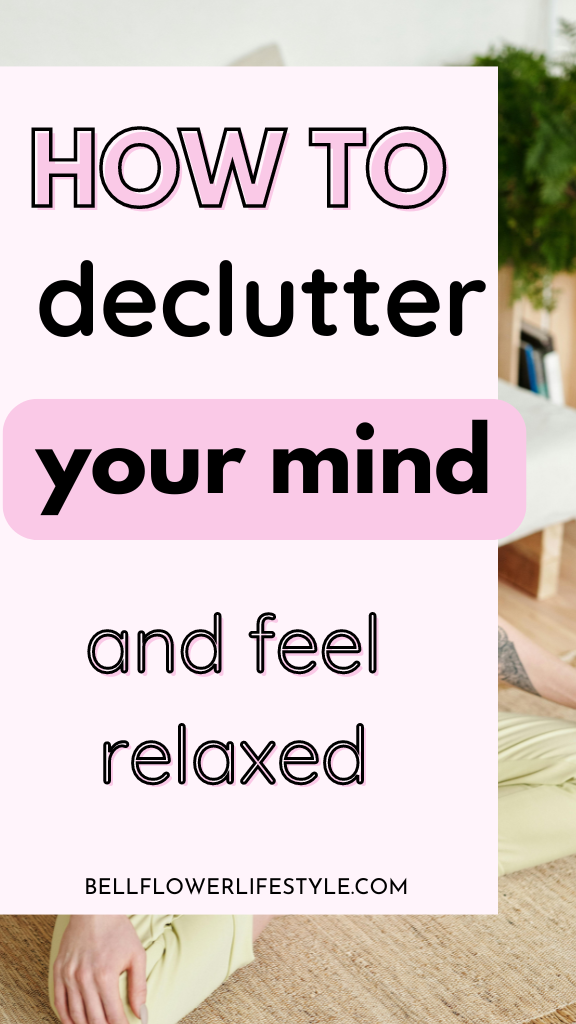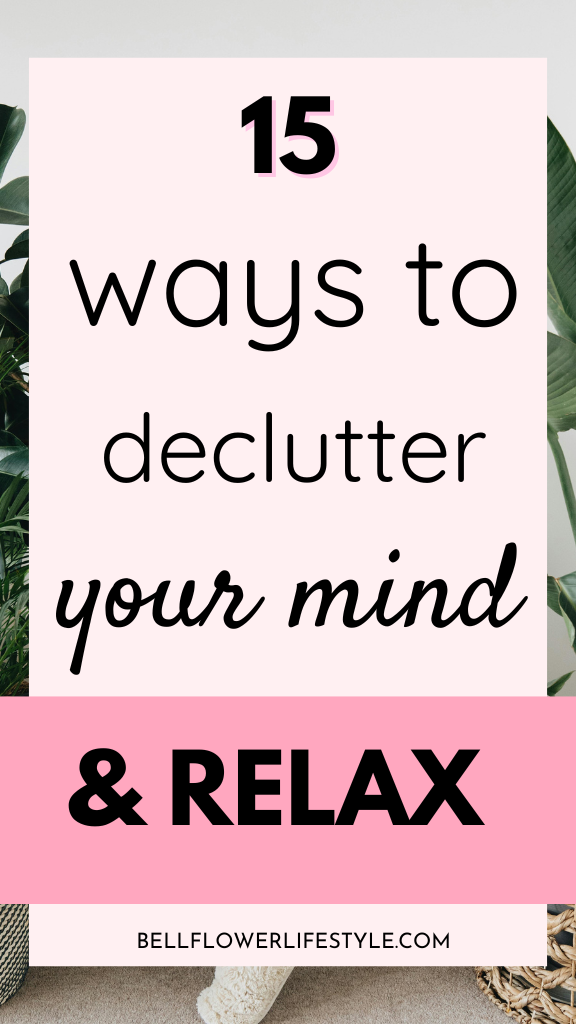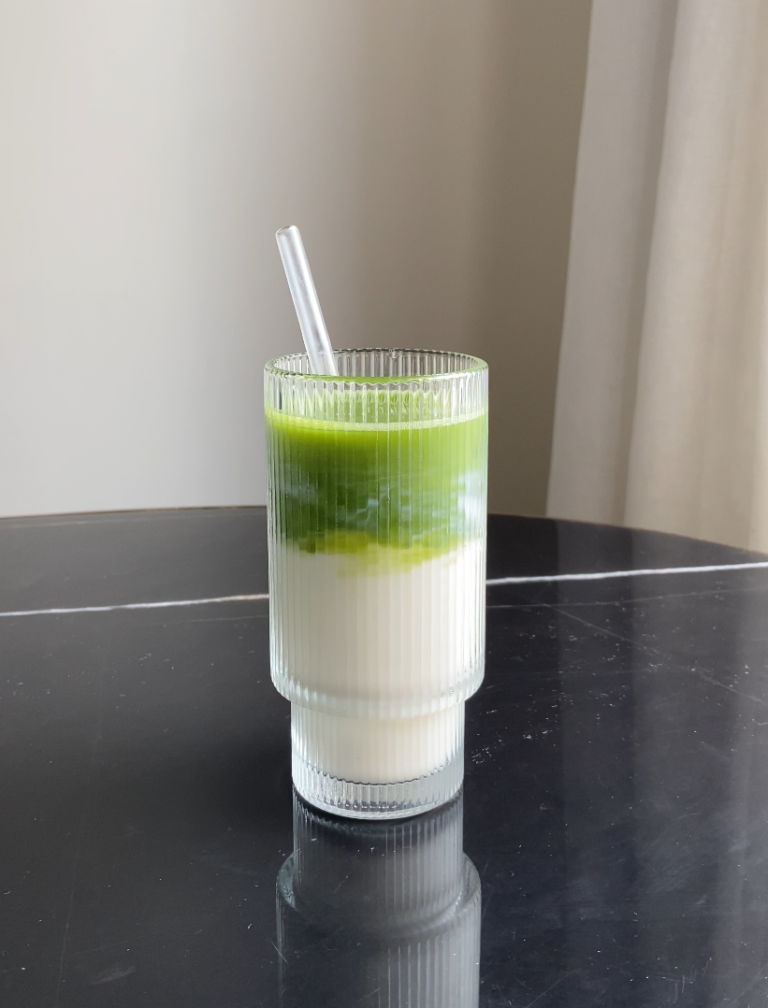How to declutter your mind and feel relaxed
Too much going on in your head? It can lead to frustration and confusion about what to do! Here is how to declutter your mind and feel relaxed!

this post may contain affiliate links, which means I’ll receive a commission if you purchase through my link, at no extra cost to you. Please read full disclosure here.
A study shows that humans have around 60,000 thoughts per day—and that is a lot!
More than that, most of these thoughts are random and tend to be more negative than positive. Our mind’s main function is to look for threats and protect us, which is why it often produces negative thoughts.
This clearly explains why we struggle with our mental health, overthink, and feel mentally exhausted so often. Our minds are constantly processing information, combined with the overwhelming amount of content we consume throughout the day.
When does our mind get time to rest and clear all that noise inside?
Our minds are not at fault; they are simply doing their job of protecting us. So it’s our responsibility to make an active effort to declutter our minds and find a state of relaxation every now and then!
In this post, I will share exactly how to do that!
But first, Pin it for later!

Understanding the Cluttered Mind
Some more things that can lead to a cluttered mind are-
- Overwhelm: Too many tasks, responsibilities, or decisions can overwhelm the mind.
- Worry and Anxiety: Constant rumination about past mistakes or future uncertainties can cloud thoughts.
- Negative Self-Talk: A critical inner voice can create a mental clutter.
- Distractions: Constant notifications, social media, and multitasking can fragment attention.
How to Declutter your mind – 15 ways
1. Letting go

There is a dialogue from a Hollywood movie that I totally do not remember, where a woman says to her friend, ‘Our minds get 1,000 thoughts every day. If you’re going to listen to each of them, you will go crazy.’
And it totally makes sense! We get 60,000 to 60,000 thoughts every day, and if we attach meaning or focus to most of them, we will go crazy and get frustrated.
This is what we learn in meditative exercises, too. As we sit to meditate, we are not trying to prevent thoughts from occurring but rather letting them go as they come—not holding on to any and allowing these thoughts to pass like clouds.
I have been actively practicing this. When I find myself holding on to thoughts, I realize that it is just a thought;
it has no meaning until I give it one. So I let it go and focus on what I need to do in the moment, which leads me to my next point!
2. Be more Present
Being more present in what you are doing and where you are can help prevent overthinking about the past or future.
Engage yourself in something that captivates you so fully that your mind has no time to think about anything else.
Being present has been my main focus for a while, and this practice has truly changed my mental well-being over the past year!
I have stopped giving so much importance to the future and what is going to happen. Instead, I try to find ways to feel happy and content in the moment, and it has been serving me really well!
3. Brain Dump Journaling

Of course, there are days when I find myself overthinking and filled with doubts and fear. It’s a part of living life, but as I become more aware of these patterns, I take out my journaling notebook and dump everything on my mind.
I write down everything that is bothering me and why, and I get to the root of it.
A lot of times, these thoughts turn out to be pointless worries, and I feel immediately better after journaling everything out of my system!
This is the easiest way to declutter your mind and feel relaxed!
4. Vent or talk to someone
Sometimes, journaling alone does not help you feel better until you share your thoughts with someone, whether to feel understood or to get advice.
I know some people struggle with expressing their worries to friends and family because they don’t want to burden them.
Remember, you are not burdening your loved ones by venting. If a close friend of yours was struggling alone, you would want her to share with you so she could feel better and receive your support.
Likewise, your friends will always be happy to help!
5. Connect with nature
Being stuck in your room all day will only clutter your mind with thoughts. It’s essential for everyone to step outside for some time each day. Connecting with nature can instantly ease your brain and calm the noise inside!
6. Declutter Your Space

An unorganized, cluttered space can make it difficult for you to relax. You may feel uneasy or anxious, as your physical environment reflects your mental well-being.
A simple decluttering and organizing routine can help you feel lighter, especially when you have a lot going on in your head.
7. Limit Social Media Use
A dopamine detox is essential if you want to declutter your mind.
With so much information coming in every second and endless scrolling, your mind gets cluttered with information that may not serve any purpose in your life.
This can lead to feelings of FOMO or comparison, inducing negative thinking and making it harder to stay present and relax.
8. Stop focusing on the next step instead of the outcome

A lot of worries and mental clutter originate from our future planning.
When we have goals and are trying to work toward them, we often become consumed by the outcome rather than the process.
Our focus shifts to when we will achieve our goals, what if it doesn’t go the way we want, and everything else related to the final outcome.
This leads to procrastination, overthinking, fear, and anxiety, and we eventually end up doing nothing.
However, if you let go of the outcome and shift your focus to the next step you need to take each day, you keep yourself in a mode of doing rather than thinking. Not only will your mind be at peace, but you will also achieve your desired results in no time.
Forget the when, how, what-ifs, and buts—just focus on YOUR NEXT STEP!
9. Mediative exercises
There are plenty of guided meditative exercises on YouTube that can help you declutter your mind and clear away unwanted thoughts.
I always turn to guided meditations when I find that journaling or talking isn’t helping me feel better.
I focus on meditations related to the things I’m struggling with, such as fear, overthinking, stress, anxiety, and so on
Here is a simple mediative exercise on YouTube you can follow!
10. Gratitude
Trust me when I say this: most of our worries and cluttered thoughts stem from focusing on what we lack.
When you are constantly focused on what you do not have, what you need, and all these desires, you end up overthinking and feeling fear and anxiety.
This is not a healthy place to be in. Focusing on lack means you will always attract more of it into your life, leaving you feeling incomplete.
On the other hand, if you shift your focus to abundance by feeling grateful for all the things you have now, you will experience less clutter and fewer worries.
You’ll realize that there is enough abundance in your life and nothing to worry about.
Just as you have received everything you needed before, you will receive everything else you want in time.
Start practicing gratitude daily by writing down the little things you feel grateful for!
11. Use social media mindfully

We don’t often realize that when we scroll through social media, we are consuming content that can trigger our fears even more!
The algorithm has become so advanced that if you are talking about or searching for a specific topic, it will start showing you more of those things.
A friend of mine shared that while she was chatting with another friend about her partner and topics related to loyalty and cheating, she noticed that after a while, she started getting more reels and TikToks about cheating and toxic men on her feed.
At first, she watched these videos back to back, which triggered her and induced fear. But later on, she realized how social media was really affecting her mindset. It is definitely scary.
So, being mindful of the types of content you are watching and listening to on these platforms is very essential!
12. Engage in Physical Activity
Physical activity has been proven to help clear your mind and refocus your attention on your body. When you move your body, you’ll find that you’re not actively thinking, giving you a period of relaxation and a decluttered mind. Plus, you’ll feel good, too!
13. Limit Negative Input
Just like with social media, be aware of all the ways you input information into your mind throughout the day. For example:
- News Consumption: Be mindful of your news consumption, as it can contribute to anxiety and fear.
- Surroundings: Create a positive environment by minimizing exposure to negative influences.
14. Pursue Activities That Keep You Engaged

You can also pursue hobbies that keep you engaged in the art of doing and having fun. This helps you forget and release whatever is on your mind, allowing you to relax!
I’m an avid lover of building hobbies! Here are 67 Insanely Great Hobbies for 20 somethings adults
15. Practice Positive Affirmations
Lastly, to reprogram your mind from negative thoughts and beliefs formed over time, you need to reinforce new positive beliefs.
Start saying more positive affirmations, and you will feel lighter and better!
Conclusion on how to declutter your mind
Remember, decluttering your mind is an everyday process, not a one time solution for life. Be patient with yourself and celebrate small victories.
Incorporate these techniques into your daily routine for long-term benefits.
Liked this post? Pint for later!

If you like this, you will love–
- 30 Mental health goals for a peaceful life
- 19 Unhealthy Habits for Your Mental Health
- 35 Tiny positive mental health habits to naturally boost your mood
- 4 Happy Brain Chemicals You need to know for Better Mental Health
- 11 realistic tips on How to take a mental break
- 15 Borderline Genius Habits to become mentally strong for all women!
- 17 Fun and simple Mindful activities for adults
- 25 Powerful Mindset journal prompts to overcome limiting beliefs
- 23 Mindful Me Time Activities you will absolutely love
- 37 Abundance Journal Prompts for Growth Mindset and life
- Journaling for Mental Health: How to Start Journaling and stick to it
Follow me On Pinterest





